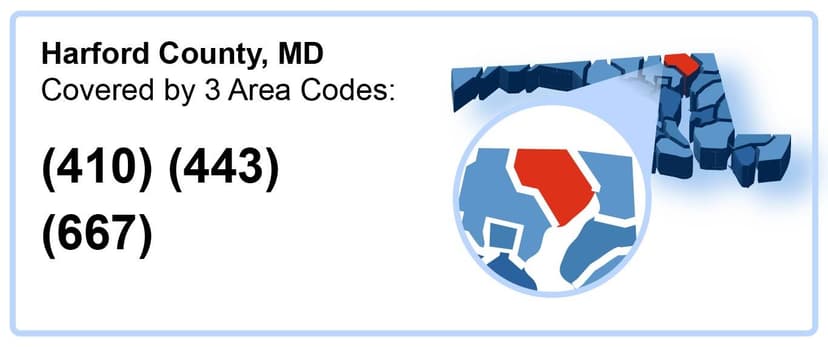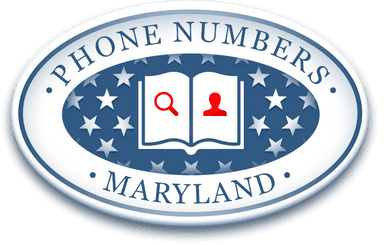What are Harford County Area Codes?

Area codes are the three digits that begin every North American telephone number. An area code designates a location as a numbering plan area within a state and shows where a phone call originates. The use of area codes started as part of the North American Numbering Plan, which is a basic numbering scheme permitting interoperable telecommunications services within the country. The North American Numbering Plan divides the regions of member nations into geographic numbering plan areas.
There are currently three area codes that cover Harford County. These area codes serve the whole of Harford County and parts of surrounding counties.
Area Code 410
Area code 410 covers Harford County and other parts of the Eastern half of the U.S. State of Maryland, including the Baltimore Metropolitan Area. Area code 410 was introduced on October 6, 1991. It was implemented in permissive dialing mode, with the 10 digit-dialing scheme coming in for local calls that fall within area code 310/410 boundaries. Area Code 410 covers a total of 125 cities in Maryland with over 800 exchanges. The cities include Aberdeen, Bel-Air, Havre De Grace, Darlington, Edgewood, etc. Area code 410 was close to exhaustion within five years of operation partly as a result of the proliferation of cell phones and pager in the area. In response to this, a new overlay plan was created.
Area Code 443
Area code 443 was overlaid onto the area code 410 territories on July 1, 1997. Area code 443 serves Harford County and 16 other counties in the U.S. State of Maryland. This area code currently covers 97 cities in Maryland. Some of these include Aberdeen, Edgewood, Bel Air, Havre De Grace, Darlington, etc.
Area Code 667
Area code 667 was overlaid onto the area code 410/443 territories on March 24, 2012. Area code 667 covers Harford County and parts of 16 other counties in Maryland. There are currently 82 cities using this area code in Maryland. These cities include Darlington, Havre De Grace, Fallston, etc.
What Are the Best Cell Phone Plans in Harford County?
A 2018 National Center of Health Statistics survey showed that 39.4% of adults in Maryland exclusively used wireless telephone services compared to the 3% that used landlines only. Over 28% prefer to use wireless telephone services majorly, while 19.4% are comfortable using both wireless telephone services and landlines.
The disparity is more significant among minors in Maryland (under 18) as 49.1% used only wireless telephone services. By contrast, only 0.8% of Maryland minors under the age of 18 exclusively used landlines as their telephony service. In the State, 31.6% of children preferred wireless telephone services, while less than 2% used landlines more. A total of 13.9% of Maryland children used both landlines and wireless telephone services. These figures infer that cell phones have gained more popularity among young people compared to landlines.
There are four primary phone carriers- At&T, Verizon, T-Mobile, and Sprint in Maryland, along with several Mobile Network Operators (MVNOs). The major networks offer strong service within Harford County. AT&T provides the best service coverage with about 99.17%. Residents can subscribe to plans ranging from $65-$85. T-Mobile follows closely with 95.16% coverage. Interested persons can subscribe to plans ranging from $60-$85. Verizon comes third with about 94.33% coverage, while Sprint offers 90.75%. Despite scoring high in terms of coverage, phone users may struggle with network issues when they visit rural areas or densely populated areas.
The State of Maryland allows several telephone services within the state and one of such services is Voice over Internet Protocol (VoIP). In Harford County, several companies allow residents to subscribe to VoIP plans of their choice. Despite the surge in the price of VoIP services, Harford County and the State Government do not perform an oversight function on VoIP providers in the state. The Federal Communication Commission does have oversight over VoIP providers in Harford County, and Maryland as a whole.
What Are Harford County Phone Scams?
These are scams committed against citizens of Harford County with telephones. Phone scams may be carried out via calls, email, text messages, etc. Residents of Harford County can identify potential phone scams by performing reverse phone number lookups. Common scams committed in Harford County include:
What Are IRS Scams?
This one of the most common phone scams in Harford County. In this scam, the victim receives a call from someone who claims to work with the IRS. Scammers tell their victims that they owe certain amounts of money, and failure to pay up immediately will lead to their arrest. Next, the scammers inform the victims of how to pay the debts. Scammers often ask victims to purchase gift cards and send the numbers on the cards to them. As soon as the numbers are sent, the scammers hang up, leaving no trace. Residents of Harford County are to avoid making payments in response to telephone calls. It is best to take a moment and ask if the IRS can request payment in such a manner. Residents can always use suspicious phone number lookup service to identify the origin of calls.
What Are BGE Payment Collection Scams?
In this scam, citizens and businesses are contacted by persons claiming to work for BGE. The callers demand payment via wireless transfers, gift cards, or prepaid cards for some past due bills. They often threaten the victims that power will be disconnected if they do not pay. It is important to note that BGE will never ask customers to pay for bills using gift cards. The best way to avoid this scam is to be vigilant and patient. Always find out if the call is from a legitimate business. A reverse phone number lookup can help in such cases.
What Are Fraudulent Service Negotiation Scams?
In these scams, con artists put up fake ads on care.com and similar websites, offering their services. Unsuspecting victims are lured into believing the ads. Once the negotiation is concluded, the scammers send fraudulent checks to the victims, asking them to deposit the money in their accounts. The victims are then asked to withdraw cash from their accounts to deposit in other accounts where the suspects can access the funds. By the time the victims realize that they have been scammed, it is too late. Residents may avoid falling into this scam by identifying who the caller is through phone lookup tools.
What Are Fallen Heroes Scams?
Residents of Harford County have been receiving calls from persons claiming to work for the local Fraternal Order of Police (FOP). The caller claims to be soliciting funds for the families of fallen deputies. Scammers often appeal to their victims’ emotions. Once the victims have donated, they no longer hear from the scammers. Deputies within the Harford County Sheriff’s Office are not currently represented by any FOP and union members. The Harford County Deputy Sheriff’s Union would never call you to solicit a donation. Victims of fallen heroes scams should contact the Harford County Sheriff's Office immediately. Individuals can identify 'who called' them using free reverse phone lookup services. Residents can answer questions like 'who is the number registered to?' using these tools.
What Are Sheriff Deputy Scams?
In this scam, someone claiming to be the Deputy Sheriff of Harford County informs a victim that there is a warrant for their arrest. The warrant is usually a result of non-appearance before the Grand Jury. The caller then makes a proposal that will enable the victim to avoid arrest. Scammers usually tell their victims to make payment such as fines, or compensation to avoid arrest. The Harford County Sheriff's Department will never solicit money via the telephone or in person. Residents who have been victims of these scam can report the incidents to the police by calling 410-838-6600. Residents may confirm the true origin of the call using phone number lookup by address tools or phone number lookup by name tools.
What Are Robocalls and Spam Calls?
A robocall is a phone call that uses a computerized auto-dialer to send pre-recorded messages to a target audience. Robocalls are mostly used by telemarketing companies, politicians, and public agencies. Maryland is currently one of the states with more robocall cases in the country. Maryland ranked first on a list of states hit hardest by robocalls in 2019. Due to the proliferation of such calls, it is difficult to identify a potential scam activity. Scammers use robocalls to steal confidential information or money from unsuspecting individuals. Reverse phone lookup services can confirm if incoming calls are robocalls.
The best options, if you receive a robocall are to:
- Hang up immediately. Do not follow any instructions given by the voice system.
- Report illegal robocalls to the FTC online or call 1-888-382-1222 or the Harford County Sheriff.
- Use any trusted online services provider that offers phone number searches free of charge to identify illegitimate robocalls.
- Add your number to the National Do Not Call Registry. Inclusion in this registry exempts the phone number from receiving robocalls and other sales calls from telemarketers and businesses.
How to Spot and Report Harford County Phone Scams?
Scammers are always seeking new schemes to steal from unsuspecting citizens. The surest way to combat scams is vigilance and education. Tools such as reverse phone number lookup services can help identify potential phone scams. There are always red flags that can help you identify potential scam calls. They include:
- Requests for immediate action for a problem that does not have specified timelines.
- The use of aggressive tactics to coerce you into giving up sensitive personal information. Scammers may use threats of fines, suspension, revocation of license, and even arrest.
- Requests for information the agency should have in their database. Unsolicited requests from strangers for personal information are scam calls.
- Strange rewards or benefits you did not apply or register for. Scammers often use them to play on the victims’ emotions and defraud them.
- Strict instructions on how to make payment for tax, training, or utility bills. Scammers often ask the victims to make payments by gift cards, wire transfer, or any other means that make retrieving the money difficult.
Companies that conduct reverse phone lookups are helpful against phone scams. Individuals can use either the free phone number lookup or a paid phone number search service to identify the origin of phone calls. Public institutions in Harford County provide information and assistance to residents who have been victims of phone scams or individuals who suspect a potential phone scam. These institutions include:
Harford County State's Attorney Consumer Protection Division - The Consumer Protection Division is a section in the State Attorney's Office that protects citizens of Harford County from Scams. The unit maintains a consumer hotline 410-528-8662. The Consumer Protection Division may also assist victims to conduct phone number searches where necessary.
Harford County Sheriff's Office - The Harford County Sheriff Office provides updates on recent scams perpetrated in the county. Residents who have been victims of phone scams can report to the Sheriff's Department. Individuals may register their complaints by contacting this telephone number 410-838-6600.
Better Business Bureau - The Better Business Bureau is the hub of information on legitimate business entities registered in Harford County. The BBB also provides information about common business scams in the County.
Federal Trade Commission - The FTC is charged with the responsibility of protecting consumers from fraud. The FTC initiated the National Do Not Call Registry as part of its efforts to eliminate unwanted calls. Adding your phone number to the registry exempts you from receiving several unwanted calls.
